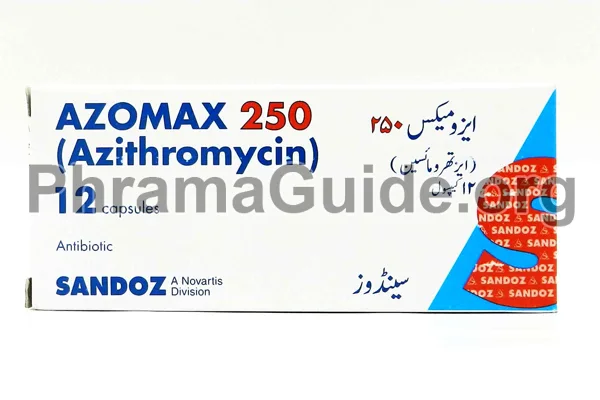Azomax tablet is a broad-spectrum antibiotic that is primarily used to treat respiratory infections (upper and lower). It belongs to a class of antibiotics known as macrolides. Following are some common and off-label uses of Azomax tablets:
Common Uses of Azomax Tablet
- Respiratory Tract Infections: Azomax tablets may be used to treat various respiratory infections, including:
- Bronchitis
- Pneumonia
- Sinusitis
- Pharyngitis (sore throat)
- Tonsillitis
- Skin and Soft Tissue Infections: Azomax tablets can be used to treat bacterial infections of the skin and underlying soft tissues, such as cellulitis.
- Ear Infections (Otitis Media): Azomax tablets may be used to treat middle ear infections in both children and adults.
- Sexually Transmitted Infections (STIs): Azomax tablets can be used to treat certain sexually transmitted infections caused by susceptible bacteria, including:
- Chlamydia
- Gonorrhea
- Genital and Urinary Tract Infections: Azomax tablets may be used for infections of the genital and urinary tracts.
- Traveler’s Diarrhea: Azomax tablets may be used to treat traveler’s diarrhea caused by certain bacterial pathogens.
- Lyme Disease: Azomax tablet is sometimes used as an alternative treatment for early-stage Lyme disease, particularly in individuals who are allergic to other antibiotics commonly used for Lyme disease.
- Prevention of Endocarditis: In certain situations, Azomax tablets may be used to prevent bacterial endocarditis in individuals with certain heart conditions undergoing dental or surgical procedures.
Off-label Uses of Azomax Tablet
- Chronic Obstructive Pulmonary Disease (COPD): In some cases, Azomax may be used off-label for its anti-inflammatory properties in individuals with severe COPD, particularly those with frequent exacerbations.
- Cystic Fibrosis: Azomax tablets may be considered as part of a treatment plan for individuals with cystic fibrosis to help manage pulmonary exacerbations and reduce inflammation.
- Acne: Azomax tablets may be used off-label in the treatment of acne, particularly in cases where other antibiotics have not been effective.
- Chronic Rhinosinusitis: Azomax tablets may be considered in the treatment of chronic rhinosinusitis, particularly in cases where bacterial infection is suspected.
- Interstitial Lung Disease (ILD): In some cases, Azomax tablets may be used off-label as an anti-inflammatory agent in individuals with ILD, to potentially reduce exacerbations.
- Periodontal Disease: Azomax tablet may be considered as an adjunctive treatment for periodontal disease, particularly in cases where bacterial infection is difficult to control.
- Bronchiolitis Obliterans Syndrome (BOS): Azomax tablets may be considered in the treatment of BOS, a complication of lung transplantation, to potentially reduce inflammation and improve lung function.
- Inflammatory Bowel Disease (IBD): Azomax tablets may be used off-label to help manage symptoms and inflammation in individuals with IBD.

What is Azomax?
Azomax is one of the leading brands of Azithromycin, manufactured and marketed by Novartis, Pakistan.
Azomax Alternatives : Other Similar Brands
The following are some alternative brands of Azomax and their manufacturers.
- Azitma : Sami Pharmaceuticals, Pakistan.
- Zetro : Getz Pharmaceuticals, Pakistan.
- Macrobac : Asian Continental Pharmaceuticals, Pakistan.
- Zyto : High-Q Pharmaceuticals (Pvt) Ltd, Pakistan.
- Azotek : Saffron Pharmaceuticals, Pakistan.
- Zezot : Bosch Pharmaceuticals, Pakistan.
- Zithromax : Pfizer Pharmaceuticals.
- Atizor : Macter International.
- Exthro : Indus Pharmaceuticals, Pakistan.
- Azitral : Nova Med Pharmaceuticals, Pakistan.
- Rescue : Standpharm Pakistan (Pvt) Ltd.
Azomax : Available Formulations and Strengths
Presently, Azomax is available in Tablet, Capsule, and Suspension forms
Azomax Tablet : 500mg strength
Azomax Capsule : 250mg strength
Azomax Suspension : 200mg/5ml strength
Who Should Not Use Azomax?
- Allergy to macrolide antibiotics: Individuals who are allergic to azithromycin or other macrolide antibiotics, such as clarithromycin or erythromycin, should not use Azomax.
- Severe liver disease: Azomax is metabolized by the liver, so it should be used with caution in individuals with severe liver disease.
- Severe kidney disease: Azomax is eliminated from the body primarily through the kidneys, so it should be used with caution in individuals with severe kidney disease.
- Heart rhythm disorders: Azomax can cause changes in the electrical activity of the heart, which can lead to a potentially life-threatening irregular heartbeat, so it should be used with caution in individuals with heart rhythm disorders.
- Myasthenia gravis: Azomax can worsen the symptoms of myasthenia gravis, a neuromuscular disorder that causes muscle weakness and fatigue.
- Pregnancy and breastfeeding: Azomax should be used with caution in pregnant or breastfeeding women, as there is limited data on its safety in these populations.
What is the Recommended Daily Dosage of Azomax Tablet?
Azomax tablet Dose for Respiratory Tract Infections:
(for bacterial sinusitis, pharyngitis/tonsillitis, and community-acquired pneumonia)
- One tablet of Azomax 500mg once daily for 3 days, or one tablet of Azomax 500mg once daily for 5 days in some cases.
Azomax Tablets Dose for Skin and Soft Tissue Infections:
(for mild to moderate skin and soft tissue infections, such as impetigo)
- One tablet of Azomax 500mg once daily for 3 days.
Azomax Tablets Dose for Sexually Transmitted Infections:
(for uncomplicated chlamydia or gonorrhea)
- Two tablets of Azomax 500mg as a single dose.
Azomax Tablets Dose for Ear Infections:
(for otitis media / middle ear infection)
- 30mg/kg as a single dose or 10mg/kg once daily for 3 days.
How Azomax Works?
Azomax works by blocking the production of essential proteins in bacteria that are required for the growth and replication of a bacteria.

Leave A Comment